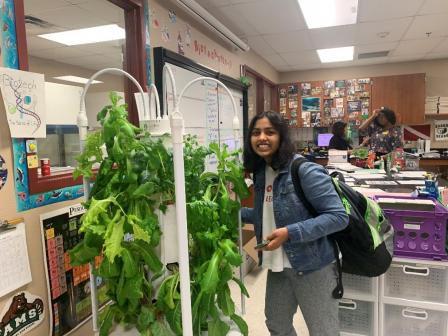News Releases from Region 09
U.S. EPA honors Chandler, Ariz., student with President’s Environmental Youth Award
CHANDLER, Ariz. – The U.S. Environmental Protection Agency (EPA) has awarded the President’s Environmental Youth Award (PEYA) to Nikita Bharati, an 11th grader in Chandler, Arizona. This national award is presented each year to K-12 students who demonstrate the initiative, creativity, and problem-solving skills needed to address environmental problems and find sustainable solutions.
“As we celebrate the 50th Anniversary of Earth Day, we are also celebrating nearly 50 years of environmental education that fosters awareness about conservation issues, and helps communities make informed, responsible decisions about their environment,” said EPA Administrator Andrew Wheeler. “We are also honoring dedicated educators who spark enthusiasm in our youth to develop a love and respect for the environment and find solutions for issues that impact our air, water and land.”
“We’re proud to honor the next generation of young environmental leaders who are helping solve environmental challenges and create a more sustainable future,” said EPA Pacific Southwest Regional Administrator John Busterud. “These students are making a real difference with far-reaching impacts in their communities and future generations.”
As a member of the non-profit Arizona Sustainability Initiative, high schooler Nikita leads two projects within the Sustainable Food Systems Priority framework. The projects have reached more than 3,000 Arizona students who are learning about environmental sciences and sustainable food systems by using technology to grow and harvest healthy foods right in the classroom.
“Throughout my childhood, I frequented trips to India, often to visit close relatives and their hometown. I regularly noticed the poor conditions they lived in, ranging from the scorching summer days to times when my relatives would struggle financially due to heavy monsoon seasons damaging their crops, the main source of their income,” said student Nikita Bharati. “My great fear of how these issues would go on to impact my generation and those to come became a call for change and an inspiration for my environmental work.”
 Nikita Bharati standing next to one of the many vertical gardens. Nikita’s first project, Food Tech for the Future: Growing Digital Farmers, introduces high school students, teachers, volunteers and the community to “food computers” by building a chamber with robotics to control climate, energy and plant growth to raise vegetables. This highly interactive project allows students to learn about biology, water efficiency, genetics, robotics and technology by conducting their own plant growth experiments.
Nikita Bharati standing next to one of the many vertical gardens. Nikita’s first project, Food Tech for the Future: Growing Digital Farmers, introduces high school students, teachers, volunteers and the community to “food computers” by building a chamber with robotics to control climate, energy and plant growth to raise vegetables. This highly interactive project allows students to learn about biology, water efficiency, genetics, robotics and technology by conducting their own plant growth experiments.
The second project is the Vertical Garden program, which creates and supports a food-growing curriculum throughout 16 schools located predominantly within Maricopa County food deserts, where fresh produce is lacking. The project teaches kids how to grow food through alternative gardening methods, create the space and access for students to experiment with growing and eating nutritious foods, and provide the schools with a source of fresh produce.
From across the country, 35 students were recognized for their remarkable efforts that promote environmental education and stewardship. The 35 student award recipients – who worked on teams or individually on 13 projects – each received the President’s Environmental Youth Award. Altogether, EPA received 76 project applications from 26 states.
Established by the 1990 National Environmental Education Act, the PEYA program promotes local environmental awareness among our nation’s youth and encourages positive community involvement. EPA Headquarters works with staff located in EPA’s 10 regional offices in the selection of award recipients across the country.
To learn more about Nikita and the other PEYA winners, visit: www.epa.gov/education/presidents-environmental-youth-award-peya-winners
For information on environmental education at EPA, visit: www.epa.gov/education
Learn more about EPA’s Pacific Southwest Region. Connect with us on Facebook and on Twitter.
